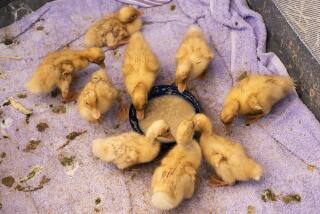Ducks and Death : Killing of Animals for Pond Project at Park Triggers Controversy
- Share via
Heather Balagia took her 3-year-old daughter, Sarah, and 5-year-old son, Terence, to Polliwog Park earlier this week on one of their favorite adventures--feeding the ducks and geese.
To their surprise, the ducks and geese at the park’s one-acre pond were gone. Not much of the pond was left either.
The city of Manhattan Beach, responding to complaints of odor and polluted water, started a $426,000 project to improve the pond’s water quality about two weeks ago.
Workers drained the pond to install a new liner and a retaining wall and will construct a redesigned bypass channel to divert polluted runoff. To make way for the construction, 83 birds and two turtles that had made the pond their home were removed and destroyed.
Couldn’t Find Homes
Several park users were irate when they learned that the animals had been killed. But city officials say that they could not find homes for the animals, many of whom once were pets that were abandoned in the park.
“This is kind of paradise to me,” said Balagia, who moved to the area from New York City a year ago. “Once they finish, it will be even better. But to kill the poor ducks. I take issue with that. They may be getting new ducks, but they won’t be the same ducks.”
Councilman Bob Holmes said in an interview that the city tried to save the birds by advertising an Adopt-a-Duck program, but only one person signed up.
At a City Council meeting Tuesday, several residents criticized the city for having the ducks and geese killed, and they contended that the Adopt-a-Duck program was not advertised well enough.
The Beach Reporter ran at least one article about the program several months ago, Holmes said.
“I think it’s just a lack of responsibility,” former Councilwoman Jan Dennis, chairwoman of the Manhattan Beach Homeowners Assn., said Thursday. “I don’t think that enough effort was made. It’s an attitude that’s very poor.”
Risk of Spreading Disease
City officials decided not to relocate the ducks and geese to another park because of the risk of spreading disease, said Les Mitchell, district supervisor for the Los Angeles County Animal Control office in Carson. The city then asked Animal Control to take the birds, he said.
“It’s not a good practice, as I understand it, to remove one colony of geese and ducks from one place to another,” Mitchell said.
Because of space limitations and the disease risk, Animal Control officers had no choice but to kill the animals when they were removed from the park Sept. 7, Mitchell said.
Pat Kelly, the director of the city’s Public Works Department, which is in charge of the project, could not be reached for comment.
“I just don’t like that they had to destroy those,” said Balagia, as she pushed her son on a swing. “How exciting it would have been for families to take them. I would have been willing to take a few.”
In addition to the pond, Polliwog Park, the largest in Manhattan Beach, includes a Little League baseball field, an amphitheater, a rose garden, children’s playgrounds and a house, one of the city’s oldest, that is being converted into a museum after being moved from its original location on 15th Street.
Series of Marshes
Jim Stecklein, the city’s parks and recreation director, said city officials believe the park site was once part of a series of marshes that extended from Hawthorne to Torrance.
At the request of neighbors, a three-acre park was built in 1964. In 1974 and 1975, about 15 acres were added to the park, and the pond was connected to the Los Angeles flood control system.
But the pond collected runoff, which polluted the water with trash and chemicals and posed the risk of disease for the animals, said Ismael Nedrano, an engineering technician for the city.
Stecklein said the pond also became polluted because it was too small to support the bird population in the park.
Another problem, Nedrano said, was that the water was stagnant. With the improvements, the water will flow more freely throughout the pond, and measures are being taken to limit the runoff flowing into it. Construction is expected to be completed by Christmas.
More to Read
Sign up for Essential California
The most important California stories and recommendations in your inbox every morning.
You may occasionally receive promotional content from the Los Angeles Times.













